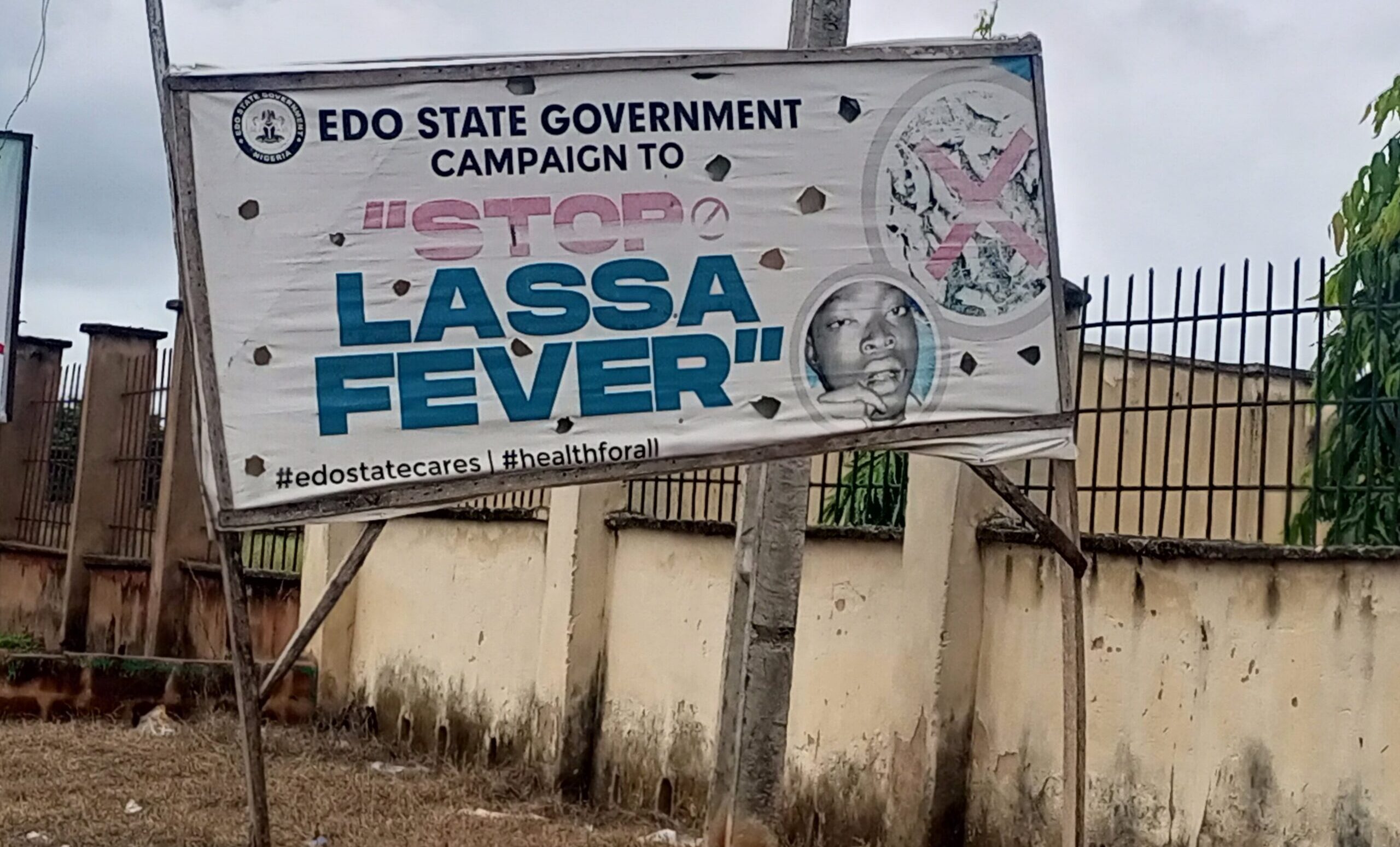On a Thursday morning in July, the cries of infants rent the air at Ugbogbo Primary Health Centre in Akoko Edo Local Government Area of Edo State. As needles pierced their skins to deliver a dose of a vaccine, children yelled uncontrollably as their mothers struggled to appease them with breast milk.
It was an immunisation day at the facility. As women poured in with their children for vaccination, they also had the chance to be educated on health issues relating to their newborns as well as their personal and environmental hygiene.
The health educators told PREMIUM TIMES that attitude change is key to dealing with outbreaks of diseases. Lassa Fever is one of the infectious diseases plaguing the area, so their message on healthy living is also aimed at checking the spread of the fever in the state.
Ondo and Edo are the two leading Lassa Fever endemic states in Nigeria, accounting for almost half of the total cases in the country. While the state governments through their departments of epidemiology are spreading awareness on how to curb it, primary health centres provide the quickest channel to reach local communities with the messages.
As the virus is largely spread by multimammate rats (Mastomys species) which live in bushy and dirty environments, residents are charged to imbibe the culture of cleanliness through messages delivered in local languages.

Gloomy statistics
According to the Nigeria Centre for Disease Control (NCDC), Nigeria had recorded 1,009 confirmed cases of Lassa fever as of Week 29, ending on 23 July. A total of 171 deaths had also been recorded within the same period (1 January to 23 July) from 111 local government areas in 28 states of the federation.
Meanwhile, the figures at the end of Week 29 of 2023 are slightly higher than those recorded in 2022, with 169 deaths recorded as of the period last year.
Nigeria experienced a surge in confirmed cases in April this year, regarded as the peak period. It reached a high of 4,702 suspected cases, five probable cases, and 877 confirmed cases between epidemiological weeks one and 16 of 2023, which ended on 23 April. A total of 154 deaths (case fatality rate, CFR, 17.2 per cent) were also recorded within the period. This also beat the 2022 record of Week 16, which had a fatality of 140 (CFR 18.6 per cent).
READ ALSO: Nigerian govt disburses N86 billion from Basic Healthcare Provision Fund – Official
There is also a 16 per cent increase in confirmed cases (897) in comparison with the 751 reported during the corresponding period in 2022.
In Ondo State, the disease is prevalent in Owo, Akure South, Akure North, Ose, Akoko South-West, Akoko South-East, and Idanre LGAs.
Edo and Ondo states have a combined fatality figure of 73, out of 171 recorded nationwide so far, amounting to about 43 per cent. Ondo recorded the highest fatality rate of 37 (22 per cent), with a total confirmed cases of 338.
The figures show a slight increase in the fatalities this year despite an enlightenment campaign and funding aimed at curbing the spread of the virus.
Campaigns in Ondo
Findings from the various PHCs visited in the two states showed a remarkable improvement in the level of enlightenment of both health workers and residents of the communities.

Bolanle Faboyede is the Officer-in-Charge of the Ugele PHC in Akure North LGA of Ondo State.
Speaking on the sensitisation strategies at the PHC, she said; “When pregnant women come to the clinic, we give them health talks on the signs and symptoms of Lassa Fever and how to prevent their foods from being contaminated.
“And at the infant welfare clinic, we also inform them on how to keep their foods from being poisoned by rats, by covering them and cleaning their environment.”
Rahmat Mohammed is a Community Health Practitioner, who heads the PHC at Ilekun in Akure South LGA of Ondo State. She said pregnant women are targeted “because they are vulnerable to diseases due to their condition.”

At Oda town in Akure South LGA, also in Ondo State, the PHC officials and health educators meet with community leaders regularly to inform them of developments in the fight against Lassa Fever, in addition to giving health talks to patients and mothers.
Resistance to change
Meanwhile, as health education officers and health workers at the PHCs across the state intensify efforts to encourage people to be hygienic, PREMIUM TIMES’ findings show that some residents are “frustrating the campaigners’ efforts.”
Some of the areas identified for poor practices of spreading uncovered food by the roadsides and dirty spots are Ogbesse in Akure North LGA, Ipele and Jot Motors in Owo LGA, and Emiloro in Akure South LGA.

While communities near local council headquarters are strictly supervised by health officers, rural communities farther away are usually poor in environmental health and sanitation. Places such as Igoba, Ugele, and Ogbese in Akure North are some of the worst culprits.
At cassava mills, people still sun-dry their garri and pupuru – a local staple in the state, a practice discouraged by the authorities.
A resident of Ugele identified simply as Madam Ajoke told this reporter that she saw no need to worry about Lassa Fever because “only God can take care of people.”
“We just have to be prayerful because all these talks about rats and Lassa Fever, it is only God that can protect us. The noise about Lassa Fever is unnecessary,” she said in Yoruba.
Heavy workload, poor manpower
A PHC, according to the National Primary Health Care Development Agency (NPHCDA), should have a minimum of 24 workers comprising four nurses or midwives, six community health extension workers, a lab technician or assistant, a record officer, an administrator, and a medical doctor, among others.
But officials say a PHC may not have a medical doctor to itself, as one medical doctor can handle a catchment area of PHCs.
The nature of staffing will also depend on its categorisation, whether it is a health clinic, a health post or a PHC.
However, Arakale PHC in Akure which serves as the coordinating centre for other PHCs in Akure South LGA, has medical doctors and consultants as well as nurses and community health workers.
That is however not the case in rural centres such as Ilekun, Oda, Esure, in Akure South; Ogbese, Ugele and Igoba in Akure North LGA where nurses or community health extension workers head the facilities.
Though the heads of the facilities who spoke with our reporter did not complain, this reporter observed an obvious shortage of manpower in the area of health education. There were lamentations that the work needed to be done by the health educators was too much for the available personnel.
The PHCs also do not have the required capacity to handle Lassa Fever cases.
Officials said they have only been trained on how to identify symptoms of the disease and to quickly alert the disease surveillance officer, who collects samples and takes them to a designated laboratory.
When the test is concluded and if positive, the patient is referred to the treatment centre at the Federal Medical Centre, Owo.
State of PHCs in Ondo
As of 2020, Ondo State had 604 PHCs but not all of them were operational. Most of those in the LGAs visited by the reporter have structures but are experiencing one challenge or the other. The major challenge is funding.

Meanwhile, the state budgeted N1.9 billion for primary healthcare in 2022, out of which about N70 million was budgeted for the renovation of primary healthcare facilities. It also earmarked N3 million for health education and mobilisation.
In 2023, the state earmarked about N1.88 billion for primary health care, with a paltry N5 million allocated for the renovation of PHC facilities. However, the state budgeted N45 million for the expansion of the Primary Health Care Board office which is located in Akure, the state capital.

The government however voted N10 million for the renovation and furnishing of 18 model laboratories across the 18 LGAs.
Ondo govt speaks
The Permanent Secretary of the Ondo State Primary Health Care Board, Francis Akanbiemu, said the PHCs have been equipped with the knowledge and motivation to enlighten communities on Lassa Fever and other endemic diseases.
He said cases of Lassa Fever are being reported to state epidemiologists as soon as they are suspected by PHC workers.
He, however, noted that on Lassa Fever, the duty of the health workers stops at alerting the state epidemiologists, and actions are taken to track and isolate such cases.
“We do not handle anything on Lassa Fever. What we do is to report any suspected case to the state epidemiologist who immediately takes it over from there,” he said. “We however work closely with the epidemiologist in terms of sharing information.”
Support PREMIUM TIMES’ journalism of integrity and credibility
Good journalism costs a lot of money. Yet only good journalism can ensure the possibility of a good society, an accountable democracy, and a transparent government.
For continued free access to the best investigative journalism in the country we ask you to consider making a modest support to this noble endeavour.
By contributing to PREMIUM TIMES, you are helping to sustain a journalism of relevance and ensuring it remains free and available to all.
TEXT AD: Call Willie – +2348098788999










